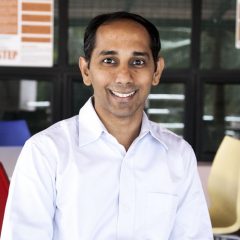Speakers: Hisham Zerriffi, Dr. Jai Asundi, and Thirumalai N.C.
Date: November 3rd, 2016

Hisham Zerriffi is an Associate Professor in Forest Resources Management at the University of British Columbia where he focuses on energy systems analysis, particularly in relation to the use of biomass as an energy source. His work examines both technical and social aspects of energy production and use and includes projects on agricultural residues, rural electrification and the use of biomass for household energy.
 Dr. Jai Asundi is the Research Coordinator at the Center for Study of Science, Technology and Policy, Bangalore, India. He is involved in projects related to Energy, Climate Policy, Sanitation and Security. His research interests lie in the areas of information technology for development. He is working on the development of decisions support systems for a variety of public policy problems. He is a senior member of the IEEE. Prior to CSTEP, Dr. Asundi was faculty in Information Systems at the University of Texas at Dallas. He holds M.S. and Ph.D. degrees from Carnegie Mellon University, Pittsburgh.
Dr. Jai Asundi is the Research Coordinator at the Center for Study of Science, Technology and Policy, Bangalore, India. He is involved in projects related to Energy, Climate Policy, Sanitation and Security. His research interests lie in the areas of information technology for development. He is working on the development of decisions support systems for a variety of public policy problems. He is a senior member of the IEEE. Prior to CSTEP, Dr. Asundi was faculty in Information Systems at the University of Texas at Dallas. He holds M.S. and Ph.D. degrees from Carnegie Mellon University, Pittsburgh.

Thirumalai N.C. is a Research Scientist at the Center for Study of Science, Technology and Policy, Bangalore, India. At CSTEP he has been involved in projects related to renewable energy and computational modelling of power generation systems. Prior to CSTEP he was associated with Dept. of Aerospace Engineering, IISc working in the field of experimental aerodynamics. He holds a Bachelor’s degree in Mechanical Engineering from University of Mysore.
Agricultural residues are a potentially significant resource for energy production, particularly in rural areas of developing countries where energy access is problematic. Harnessing such residues is challenging due to logistical issues, lack of data, competing uses for residues and, often, an unsupportive institutional environment. This talk presented research seeking to fill key data gaps on residue potential and the results of the first market assessment conducted on residues in India. The talk also presented the mapping of agro-residues for use in a first of its kind power plant being implemented in a rural part of India which uses rice husk as a fuel source to augment solar thermal for power generation. This project aims to understand aspects of biomass usage, supply chain management and inventory handling.